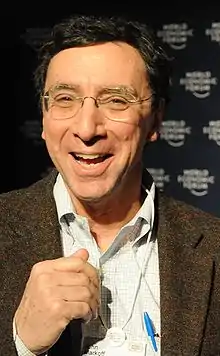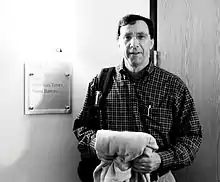John Markoff
John Gregory Markoff (born October 24, 1949[1][2]) is a journalist best known for his work at The New York Times,[3] and a book and series of articles about the 1990s pursuit and capture of hacker Kevin Mitnick.[4][5]
John Markoff | |
|---|---|
 John Markoff | |
| Born | October 24, 1949 |
| Alma mater | Whitman College University of Oregon |
| Occupation | Journalist |
Biography
Markoff was born in Oakland, California, and grew up in Palo Alto, California.[2] He graduated from Whitman College, Walla Walla, Washington, with a B.A. in Sociology in 1971. Additionally he received an M.A. in sociology from the University of Oregon in 1976.[6]
After leaving graduate school, he returned to California where he began writing for Pacific News Service, an alternative news syndicate based in San Francisco. He freelanced for a number of publications including The Nation, Mother Jones and Saturday Review. In 1981 he became part of the original staff of the computer industry weekly InfoWorld. In 1984 he became an editor at Byte Magazine and in 1985 he left to become a reporter in the business section of the San Francisco Examiner, where he wrote about Silicon Valley.
In 1988 he moved to New York to write for the business section of the New York Times. In November 1988 he reported that Robert Tappan Morris, son of National Security Agency cryptographer Robert Morris, was the author of what would become known as the Internet worm.
In December 1993 he wrote an early article about the World Wide Web, referring to it as a "map to the buried treasures of the Information Age."[3]
Markoff and Kevin Mitnick
On July 4, 1994 he wrote an article about Kevin Mitnick, who was then a fugitive from a number of law enforcement agencies. He wrote several more pieces detailing Mitnick's capture. Markoff also co-wrote, with Tsutomu Shimomura, the book Takedown about the chase. The book later became a film that was released direct to video in the United States. Markoff's writing about Mitnick was the subject of criticism by Mitnick supporters and unaffiliated parties who maintained that Markoff's accounts exaggerated or even invented Mitnick's activities and successes. Markoff stood by his reporting in several responses.
The film went much further, with Markoff himself stating to the San Francisco Chronicle in 2000, "I thought it was a fundamentally dishonest movie." (Mitnick stated that he settled a lawsuit with distributor Miramax over the film, but details were confidential; Miramax has not confirmed that.)[7]

Markoff was also accused by Jonathan Littman of journalistic impropriety and of over-hyping Mitnick's actual crimes. Littman published a more sympathetic account of Mitnick's time as a fugitive in his own book on the incident, The Fugitive Game. Further controversy came over the release of the movie Takedown, with Littman alleging that portions of the film were taken from his book The Fugitive Game without permission.
Markoff's involvement with Mitnick is thoroughly covered in the documentary Freedom Downtime, in which an interview is conducted with Markoff who is unable to elaborate on the veracity of Mitnick's charges.
Post-Mitnick
After Mitnick, Markoff continued to write about technology, focusing at times on wireless networking, writing early stories about non-line-of-sight broadband wireless, phased-array antennas, and multiple-in, multiple-out (MIMO) antenna systems to enhance Wi-Fi. He covered Jim Gillogly's 1999 break of the first three sections of the CIA's Kryptos cipher , and writes regularly about semiconductors and supercomputers as well. He wrote the first two articles describing Admiral John Poindexter's return to government and the creation of the Total Information Awareness project. He shared the 2005 Gerald Loeb Award in the Deadline Writing category for the story "End of an Era".[8] In 2009 he moved from the Business/Tech section of the New York Times to the Science section.
Markoff contributed to the New York Times staff entry that received the 2013 Pulitzer Prize for Explanatory Reporting. The series of 10 articles explored the business practices of Apple and other technology companies.[9][10] He retired from his full-time position with the New York Times on December 1, 2016.[11] He continues to work as a freelance journalist for the Times and other organizations and volunteers at the Computer History Museum.[3]
Markoff is interviewed in Do You Trust This Computer?, a 2018 documentary on artificial intelligence.
Bibliography
- The High Cost of High Tech (with Lennie Siegel) (1985) ISBN 0-06-039045-X
- Hafner, Katie; Markoff, John (1991). Cyberpunk: Outlaws and Hackers on the Computer Frontier. New York: Simon & Schuster. ISBN 0-671-68322-5.
- Takedown: The Pursuit and Capture of America's Most Wanted Computer Outlaw (with Tsutomu Shimomura) (1995) ISBN 0-7868-6210-6
- What the Dormouse Said: How the 60s Counterculture Shaped the Personal Computer Industry (2005) ISBN 0-670-03382-0
- Vise, David; Markoff, John; Templeton, Brad (2008). Should we be afraid of Google?. Princeton, NJ: Films for the Humanities & Sciences. ISBN 978-1-4213-9896-9. OCLC 244394348.
DVD video, Grade Level: 9 - 12, Post Secondary
- "A Robot Network Seeks to Enlist Your Computer". The New York Times. 20 October 2008. ISSN 0362-4331.
- Machines of Loving Grace: The Quest for Common Ground Between Humans and Robots (2015)[3]
See also
- Interview with John Markoff about What the Dormouse Said, April 13, 2006 (audio)
- The Secret History of Hacking, a 2001 documentary film featuring Markoff.
References
- "Ask a Reporter Q&A: John Markoff". The New York Times. 2007. Archived from the original on October 15, 2009.
- "John Gregory Markoff". AI and the Future of Work. MIT Computer Science and Artificial Intelligence Laboratory (CSAIL). 2017. Retrieved 2018-03-06.
- John Markoff interviewed on the TV show Triangulation on the TWiT.tv network
- https://www.amazon.com/John-Markoff/e/B004LQ8LO6
- "John Markoff". DLD Conference. Retrieved 2019-08-20.
- "John Markoff". NNDB. Soylent Communications. Retrieved 16 March 2012.
- Fost, Dan (May 4, 2000). "Movie About Notorious Hacker Inspires a Tangle of Suits and Subplots: Marin County author of Mitnick book says he was ripped off". SFGate. Retrieved October 17, 2012.
- "2005 Winners". UCLA Anderson School of Management. Archived from the original on December 16, 2005. Retrieved May 22, 2010 – via Internet Archive.
- "The 2013 Pulitzer Prize Winners - Explanatory Reporting". Pulitzer.org. Retrieved 15 April 2013.
- "2013 Journalism Pulitzer Winners". New York Times. 15 April 2013. Retrieved 15 April 2013.
- "I Covered Tech for the Times for 28 Years, And Now My Time Is Over". WIRED. Retrieved 2018-03-06.
External links
| Wikimedia Commons has media related to John Markoff. |